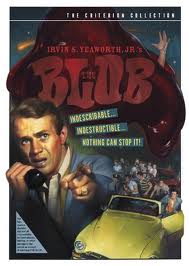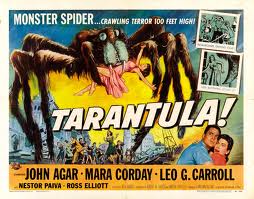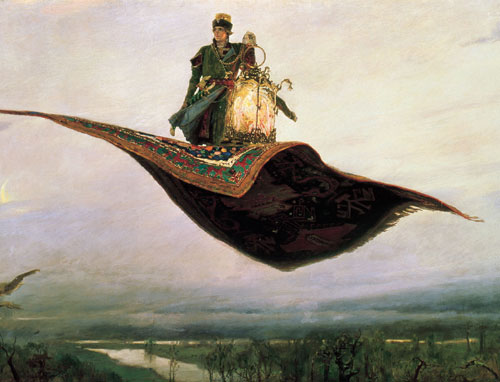 It’s Saturday morning. Cartoons are over. For whatever reason, Mom hasn’t found us for our weekly chores. Huddled under our old polyester blanket, the edge poised at our brow, my brother and I plus some occasional neighborhood friends, watch the large white letters flash on the screen of our old console TV. “ADVENTURE THEATER presents….” This was the place where my love for sci-fi horror grew. We watched the original “Planet of the Apes,” “The Blob” (Click the picture on the right for the blob song.), “Godzilla” vs EVERYTHING, and even “Abbot and Costello Go to Mars.” I lived for these kinds of shows, soaking it in like a sponge cake soaks up sauce. I believe these movies are the influence responsible for the comment I’ve heard so many times regarding my horror short stories:
It’s Saturday morning. Cartoons are over. For whatever reason, Mom hasn’t found us for our weekly chores. Huddled under our old polyester blanket, the edge poised at our brow, my brother and I plus some occasional neighborhood friends, watch the large white letters flash on the screen of our old console TV. “ADVENTURE THEATER presents….” This was the place where my love for sci-fi horror grew. We watched the original “Planet of the Apes,” “The Blob” (Click the picture on the right for the blob song.), “Godzilla” vs EVERYTHING, and even “Abbot and Costello Go to Mars.” I lived for these kinds of shows, soaking it in like a sponge cake soaks up sauce. I believe these movies are the influence responsible for the comment I’ve heard so many times regarding my horror short stories:
“The writing is similar to Stephen King. You must have read a lot of his books.”
“Um…No, I haven’t.”
The only Stephen King book I’ve read is “On Writing,” where he talks about his early childhood influences. The same shows I watched on my TV screen, he saw in the theaters. Freaky,yet cool, it shows the power these early-childhood entertainments have on us. Still, though these films were my influence, my introduction was a movie I doubt Stephen King, or probably any other writer, has ever seen.

In a small town in southern Utah, where my grandparents TV only received one station which only aired occasionally, that one station showed the 1955 “Tarantula” many times. And every time the tarantula chased a crowd of people across the desert, someone would point to the screen and say, “There’s grandpa! He’s one of the extras.”
That was my true introduction, and from that point on, throughout my childhood, I watched monster flicksl, even if I had to close my eyes and pull the blanket over my head. Is it any surprise that one of my favorite recent films is “Super 8?” J.J. Abrams took the classic monster tale and created a beautiful modernization set in the monster-movie glory days. And is it any surprise that my first short story sale was a horror about a woman who turns beetle and terrorizes an airplane full of people. It’s in my blood, and it shows up in my fiction, in some way or another, almost without fail.
Now, I mentioned librarians in the title, and though it’s completely off topic, I have to give a special thank you to my junior high librarian. Most of the districts in my state no longer pay for certified librarians, or even full-time librarians, which I think is sad. When a shy seventh-grader asked for more animal books, instead of giving me the same Black Stallion-type content I’d been reading my entire life, my school librarian opened a whole new world to me with “The Lion, the Witch, and the Wardrobe.” That was my introduction to fantasy and it sucked me in as horror sci-fi film had ten years earlier. And do I enjoy a combination of the two? Yes. An author who writes some amazing sci-fi horror meshed with old-time fantasy, is David Farland. His “Runelords” series and “The Golden Queen,” are absolutely brilliant, and though one was relegated as sci-fi, and the other as fantasy, I think an argument could be made for both fronts with both books.
So, to the amazing artists, monsters, and librarians who have influenced my life and my dreams, I can only say again, “Thank you.”


